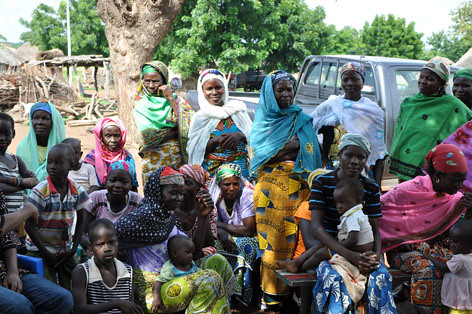Smallholder farmers in Ghana cite benefits from Africa RISING project

In a recent visit to project communities in northern Ghana, many farmers participating in field trials said that they are “thankful to Africa RISING for the many interventions introduced by the project to help their communities.”
One woman farmer leader in Nyangwa, Kassena-Nankan District, Upper Eastern Region, said “I am happy that women are not being left behind in this project. We are also grateful that the project is helping us increase crop yields by introducing new varieties and showing us better ways to plant our crops, for example, how to plant in rows.”
Another woman farmer said that women benefit by learning how to process different crops, such as soybean, cowpea, and rice into different food products.
The men farmers cited how the mother trials showed them the different available varieties of crops and how they can be planted better to get more yield. They appreciated learning how to use manure from their farm animals as organic fertilizer to improve the soil and increase yields, and the correct timing of fertilizer application. They also learned how the cropping system can be integrated into livestock farming.
The village chief in Nyangwa said, “It is good that the project is teaching our farmers how to fish…I am happy for our community because of the new technologies introduced by the project.”
The head of the farmers’ group in Tibali, Abdul Rahaman Abukari, remarked, “Projects such as Africa Rising come to the community to ask us farmers about our problems and then come back with solutions, for example, seeds resistant to drought and Striga.” Tibali has 870 residents, 61% of them women. Hence, Africa Rising’s interventions also heavily focus on making farming work less tedious for women.
Because of the drought, the farmers have just planted their crops, and are expectantly waiting for the rains to come and their crops to grow well.
The project communities in the northern Guinea savannas of Ghana continue to be plagued by drought, low fertility levels of soils and insufficient fertilizers, lack of improved varieties and seeds, low prices of produce in the markets, and other problems.
Project interventions that integrate livestock farming, e.g., poultry and small ruminants, with staple crop production, intercropping cereals and maize, and incorporating vegetables, in addition to processing technologies, using small machines to improve farm work, and better water management practices would provide farm families in the communities with options. However, farmers have to decide which package of options would work best for them and adopt those, according to Jerry Glover from USAID.
Story by Katherine Lopez (IITA)
This story was published as part of an Africa RISING special issue of the IITA Bulletin (1 August 2013)




